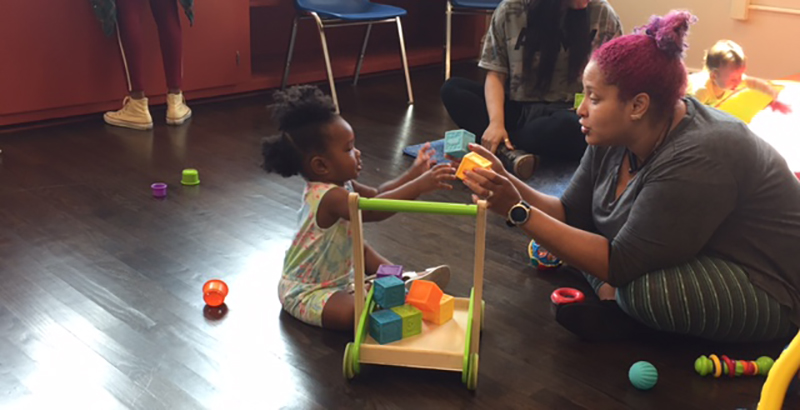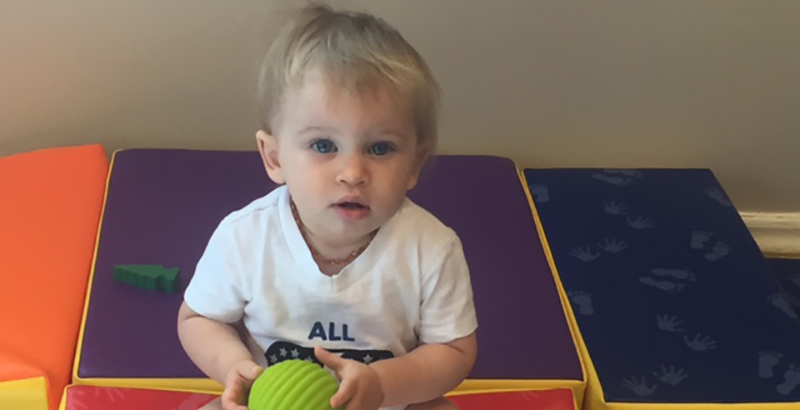Serious Play: Teaching New Orleans Parents How to Better Understand Child Development

It’s so universally true, you wonder why anyone thought to do research: More than 90 percent of parents report feeling judged about their parenting. Mothers by strangers and fathers by their partners, but aside from that difference, the experience approaches universal.
At the same time, it’s also beyond dispute that parenting and interacting with other loving adults plays a crucial role in the development of a baby’s neural pathways between birth and age 3. The quality of the interaction between caregiver and infant literally shapes the growing brain.
When the blossoming brain doesn’t get enough nurturing and stimulation — more frequent in families struggling with trauma, addiction, or poverty — the effect shows up as a gap from the start of kindergarten. Ensure that gap never opens, and you greatly increase schools’ chances of succeeding with all kids.
These two truths bookend a dilemma: How does one help parents talk to, play with, and soothe their babies in ways that support their development without suggesting they are subpar as parents?
Melanie Richardson and Christine Neely have this one down cold.
“Melanie stands at bus stops,” says Neely, Richardson’s partner in TrainingGrounds, a startup that helps parents understand early childhood development. “And in the diaper aisle at Dollar General.”
Richardson busts out in an electric smile.
“I saw you have a little one,” she says, exuding warmth and pantomiming handing over a flyer bearing the address of We PLAY, a drop-in center where the two women host playgroups. “This is a wonderful environment for your child to come play with other children and develop and be ready for kindergarten.”
“This takes it away from them and puts it on what’s here for your child,” says Neely. “If you asked Melanie and I to make a list of top parenting things, those are the same issues that will come out during a play session.”
The two narrate — a style of describing what’s going on at any given moment that fills an infant’s environment with language. “If an 18-month-old snatches a toy we announce, ‘Oh, look, he snatched a toy,’ ” says Richardson. “That’s so age-appropriate! He doesn’t have the words yet to say what he wants.”

We PLAY is intended to fill a vacuum in New Orleans’s early childhood education landscape. Thanks to a federal grant made to Louisiana for preschool for 4-year-olds, the city’s K-12 schools have been busily adding pre-K classrooms.
There is almost no funding and little opportunity for preschool for children ages 0–3 whose parents aren’t affluent enough to pay private providers, however. This leaves a void in which New Orleans’s youngest learners aren’t exposed to the rich language and other advantages of early ed and their parents don’t have pre-K providers to talk to about child development.
“Play is the work of a child,” says Neely. “They’re doing work. Seven hundred neurons a second are either developing or not developing, depending on their relationship with their caregiver.”
Parents are welcome at We PLAY during two free, two-hour windows a week from 9 to 11 a.m., a time when infants and toddlers are between naps and fresh. Both facilitators are on the floor the whole time, “modeling and redirecting and playing,” says Neely.
“It’s important for parents to see kids the same age as theirs but that aren’t theirs,” she adds. “There are certain indicators you can see when they are with other kids.”
A parent recently expressed concern that their child wasn’t talking as much as the others. “We said, ‘That’s OK, because we all develop at different paces,’ ” Neely recalls. “ ‘But if you want to stimulate language development at home, here are some things you can do.’ ”
Right now, We PLAY has operating funding through the end of 2017. If they are able to secure grants, Neely and Richardson would like to offer four drop-in sessions a week. They estimate they can serve a family for $150–$200 a year. If they could double the time the center is open, they believe they can increase the number of families served from 100 to 300.
If they won the lottery? There would be a We PLAY in every New Orleans neighborhood.
The two met several years ago while working at the Louisiana Children’s Museum. Through their nonprofit, TrainingGrounds, they also offer a number of parent workshops, training for early childhood educators, and support for childcare centers’ parent groups.
Unlike most 4.0 Schools fellows, Richardson and Neely didn’t hold any “pop-up” events. Based on the need they saw in their museum jobs, they were confident parents would come. So instead of staging pilots, they collected and analyzed data during two time periods.
During their 12-week fellowship earlier this year, 90 families visited We PLAY, totaling 385 contacts with parents, grandparents, and young children. Seventy families returned, and 69 percent of them said they were interested in more information on positive parenting strategies.
Richardson and Neely called the other 20, who gave reasons for not coming back, ranging from new jobs to needing to tend to older kids out of school and transportation problems.
One mother answered the phone and told Richardson she couldn’t talk because she was frantically trying to gather her kids’ things because a domestic violence shelter was sending a taxi to get them. A social worker by trade, Richardson told her to forget the clothes and toys and concentrate on documents and other essentials they would need to get re-established.
And yes, when We PLAY turns out to be more friendly than judgmental, larger questions sometimes get posed.
“One couple was there 45 minutes and then the mother said, ‘Ma’am, you know what, we’re homeless,’ ” recalls Neely. “ ‘Is there anything you know that would help?’ ”
Although the two do, in fact, increasingly walk right up to parents in public spaces and ask if they’re interested in opportunities for fun for their children, their visitors arrive thanks to word of mouth.
The results will be on display in New Orleans schools in a few years when the first We PLAY veterans show up for kindergarten. The TrainingGrounds founders believe the difference will be discernable.
Says Richardson: “We think it is a financially feasible way to change the trajectory.”
Get stories like these delivered straight to your inbox. Sign up for The 74 Newsletter

;)
